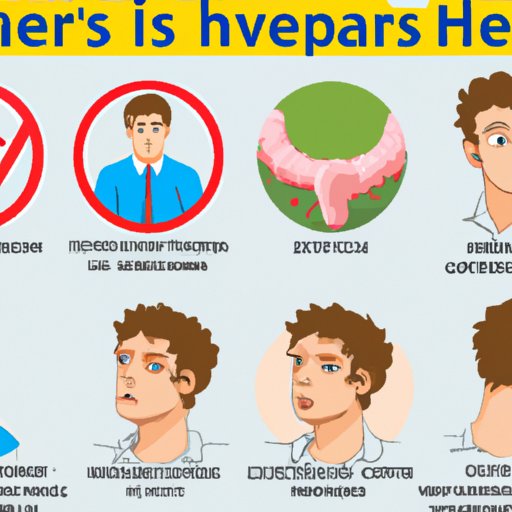Introduction
Herpes is a viral infection caused by the herpes simplex virus (HSV). It can affect any area of the body and is most commonly seen on the face, mouth, genitals, or rectum. There are two types of HSV: type 1 (HSV-1) and type 2 (HSV-2). While HSV-1 typically causes cold sores or fever blisters around the mouth, HSV-2 usually affects the genital area.
When someone is infected with herpes, they may experience a range of symptoms such as pain, itching, burning sensation, tingling, or fluid-filled blisters. In some cases, there may be no visible signs of the infection. It is important to be aware of the symptoms of herpes, the common causes of infection, the risk factors associated with contracting the virus, prevention strategies to avoid it, and available treatment options.

How to Identify the Symptoms of Herpes
The symptoms of herpes vary depending on the type of infection. Common signs and symptoms of HSV-1 include painful blisters or open sores around the mouth, lips, nose, chin, and cheeks. These blisters may appear in clusters and may be accompanied by fever, swollen lymph nodes, and sore throat. With HSV-2, the most common symptom is a cluster of small, painful blisters or sores on or around the genitals, anus, thighs, or buttocks.
It is important to seek medical attention if you experience any of these symptoms. Your doctor will be able to diagnose herpes and provide appropriate treatment.

Common Causes of Herpes Infection
Herpes is most commonly transmitted through sexual intercourse, skin-to-skin contact with an infected person, or through oral sex. The virus can also be passed from mother to child during childbirth. It is important to note that a person can be infected without having any visible symptoms.
In addition, the virus can remain dormant in the body for long periods of time and reactivate when the immune system is weakened. This means that even people who have had the virus for years may not know they have it until they experience a flare-up.

The Risk Factors for Contracting Herpes
Certain behaviors and conditions can increase the risk of contracting herpes. Having multiple sex partners, engaging in unprotected sex, and having a weakened immune system due to illness or medications can all increase the chances of being infected.
In addition, people who have had oral or genital herpes in the past are more likely to become infected again. It is important to be aware of these risk factors in order to reduce the chances of becoming infected.
Prevention Strategies for Avoiding Herpes
There are several strategies that can help reduce the chances of contracting herpes. Using protection during sexual activity such as condoms or dental dams can help prevent the spread of the virus. Limiting the number of sexual partners and avoiding contact with someone who has active lesions can also help reduce the risk.
In addition, there is now a vaccine available for HSV-2, which can help protect against the virus. It is important to talk to your doctor about the vaccine and whether it is right for you.
Treatment Options for Herpes
If you are infected with herpes, there are several treatment options available. Antiviral medications such as acyclovir, valacyclovir, and famciclovir can help reduce the severity and duration of symptoms. Home remedies such as applying ice packs and taking over-the-counter pain medications can also help manage the symptoms.
In addition, there are natural therapies such as herbs, supplements, and essential oils that may help reduce inflammation and boost the immune system. It is important to talk to your doctor before trying any natural remedy to ensure it is safe and effective.
Conclusion
Herpes is a common viral infection that can affect any area of the body. It is important to be aware of the symptoms, common causes, risk factors, prevention strategies, and available treatment options so that you can identify and manage an infection.
If you experience any of the symptoms of herpes, it is important to seek medical attention. Your doctor will be able to diagnose the infection and provide an appropriate treatment plan.
(Note: Is this article not meeting your expectations? Do you have knowledge or insights to share? Unlock new opportunities and expand your reach by joining our authors team. Click Registration to join us and share your expertise with our readers.)
